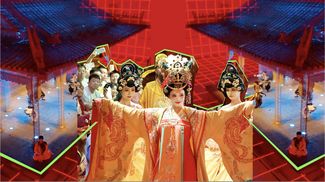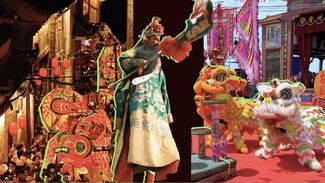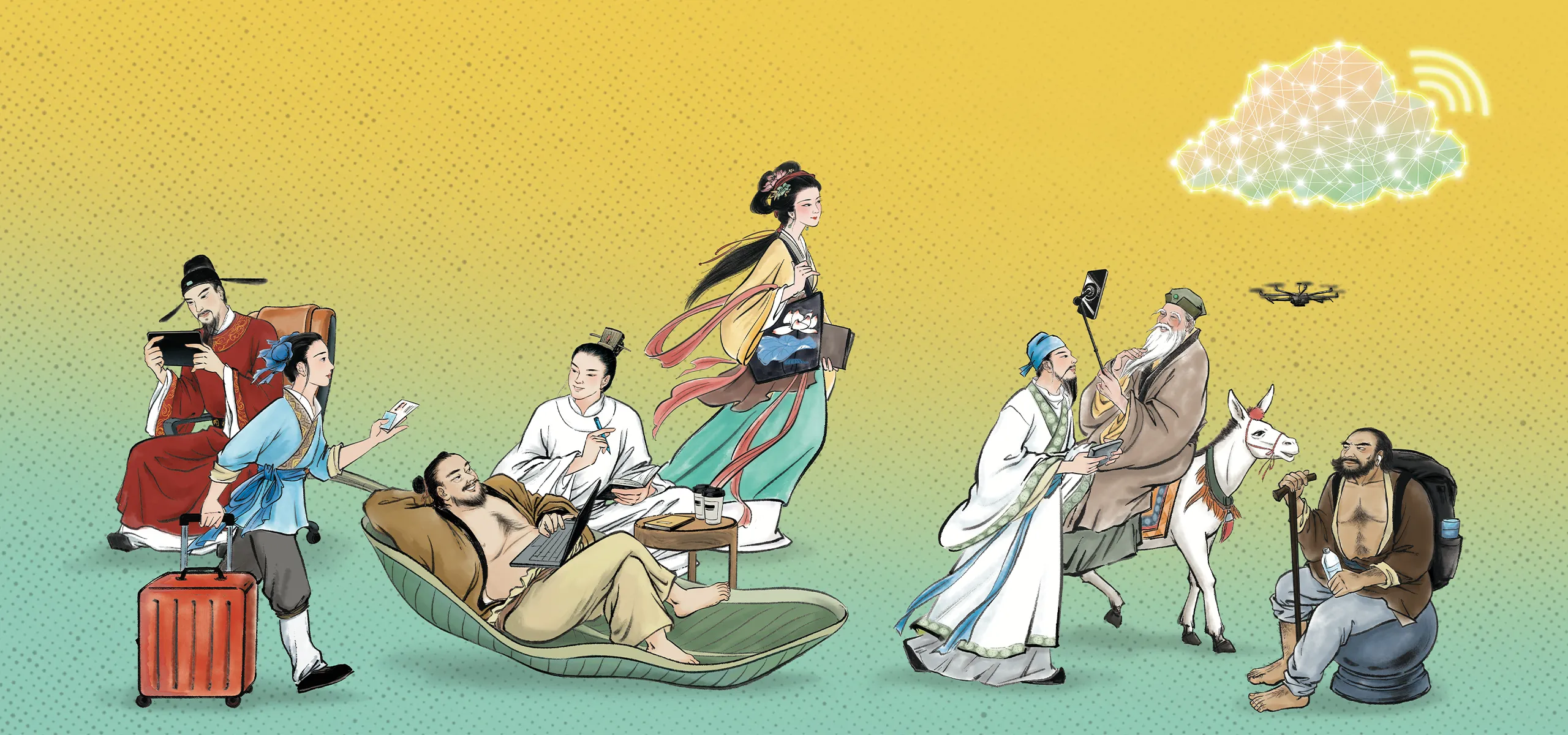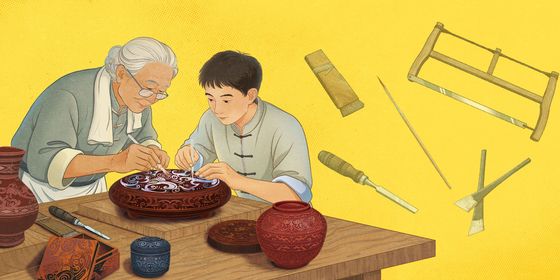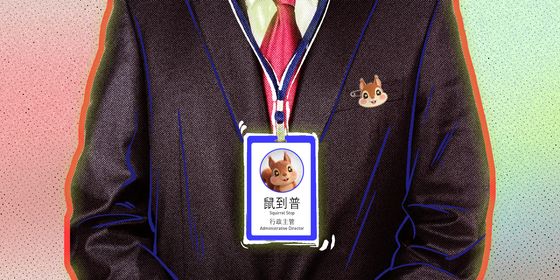How the original character for “bear” came to mean ability, power, and more
Imagine a modern company staffed by the Eight Immortals from Daoist legend, each with distinctive and complementary skills. If ever such a company were to exist, it would be unrivaled and unheard of—but not indescribable. In fact, the Chinese already have the perfect idiom for such a collective:
八仙过海,各显其能 (Bāxiān guòhǎi, gèxiǎn qínéng), or “Eight Immortals crossing the sea, each showcasing a unique ability.” This phrase comes from an ancient story about the immortals leveraging their abilities (能力 nénglì) to cross an ocean. For instance, Han Zhongli, often depicted as a bare-chested man, sailed on a banana-leaf fan, while goddess He Xiangu rode a magic lotus flower through the waves.
能力, or “ability,” is a banal word, but the character 能 (néng) has fascinating origins. In the bronze scripts used more than 3,000 years ago, 能 was shaped like a fierce animal with sharp claws—it originally meant bear, which we now write with four dots underneath to suggest legs, 熊 (xióng). The character 能 shed its association with the animal, evolving to mean “ability” and “talent.”
Learn more Chinese characters:
- 爱: The Character Defining Love in Its Many Forms
- 游: Learn the Chinese Character for Journeys and Adventures
- 育: The Character That Follows You From Birth
In modern Chinese, 能 often appears in two-character phrases, such as 能力 and 能耐 (néngnai), to suggest capability. Skills are 技能 (jìnéng), while talent is 才能 (cáinéng). Capable people are 能人 (néngrén), while individuals with specialized skills are 能手 (néngshǒu, expert).
There is also a series of idioms associated with 能: A person who can handle anything is 无所不能 (wúsuǒbùnéng), and a person who is accomplished both intellectually and physically is 能文善武 (néngwén shànwǔ), or “proficient in both culture and combat”; 能歌善舞 (nénggē shànwǔ) literally means “good at singing and dancing,” used to describe someone lively and artistically gifted.
An eloquent and pervasive person is 能言善辩 (néngyán shànbiàn), emphasizing the speaker’s logic and debate skills. But a similar idiom, 能说会道 (néngshuō huìdào), which also means “articulate,” stresses the speaker’s charm and fluency.
能 can also be about personal quality. The idiom 能屈能伸 (néngqū néngshēn), literally meaning “able to bend and stretch,” describes resilience, the wisdom to endure hardship when necessary, and the ability to seize opportunity when the time is right.
In ancient Chinese, 能 can also mean people with talent, and is often paired with 贤 (xián, virtuous and talented). In the 1st-century BCE Confucian text Book of Rites (《礼记》), Confucius described an ideal society in which “the virtuous and capable are appointed (选贤与能 xuǎnxián jǔnéng)” and honesty and harmony are upheld.
Mencius, a 4th-century BCE Confucius scholar, put renewed emphasis on the same idea when it came to state governance, suggesting that a wise ruler should let those with integrity hold high positions and those with talent take on important roles (贤者在位,能者在职 xiánzhě zàiwèi, néngzhě zàizhí).
On the other hand, Daoism—the other major school of ancient Chinese philosophy—points out a downside to being overly capable. The phrase 能者多劳 (néngzhě duōláo), meaning “those who can do, do more,” first appeared in Zhuangzi (《庄子》), a foundational Daoist text from the 2nd to 3rd century BCE. It reflects the Daoist ideal of “non-action”—allowing things to unfold naturally rather than forcing or interfering.
But watch out if your boss or coworker throws this idiom your way—in today’s workplace, it has implications: a compliment that recognizes your skills and effort while subtly signaling you should carry more load.
能 can be used in praise, as in 你太能了! (Nǐ tài néng le!)—“You’re impressive!“ But it can also have a sarcastic bite: 就你能! (Jiù nǐ néng!)—“Well, aren’t you something?” For more negative words associated with the character, there’s 低能 (dīnéng, dim-witted) and 无能 (wúnéng, incompetent).
Perhaps most frequently, 能 indicates that one possesses certain abilities, such as a child who can talk (能说话 néng shuōhuà) or walk (能走路 néng zǒulù), or an overseas student who can speak Chinese (能说中文 néng shuō Zhōngwén) or write Chinese characters (能写汉字 néng xiě Hànzì).
Another common use of 能 is to mean “energy” in the scientific sense, as in 能源 (néngyuán), which includes 电能 (diànnéng, electrical energy), 核能 (hénéng, nuclear energy), 太阳能 (tàiyángnéng, solar power), and more. In the realm of science and technology, 能 also appears in 智能 (zhìnéng), meaning “smart” or “intelligent,” as in smartphone (智能手机 zhìnéng shǒujī), or smart home (智能家居 zhìnéng jiājū).
Currently, artificial intelligence, or 人工智能 (réngōng zhìnéng), is fueling fierce competition among developers. One might say these innovators are like the Eight Immortals, individually demonstrating unique talents, but capable of changing the world when they come together.
能: A Character Capable of Anything is a story from our issue, “Smart Nation.” To read the entire issue, become a subscriber and receive the full magazine.

